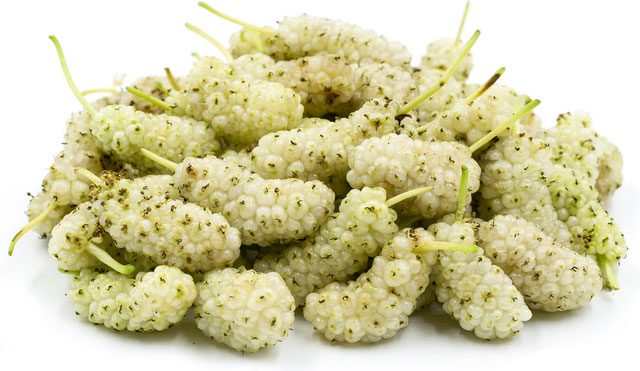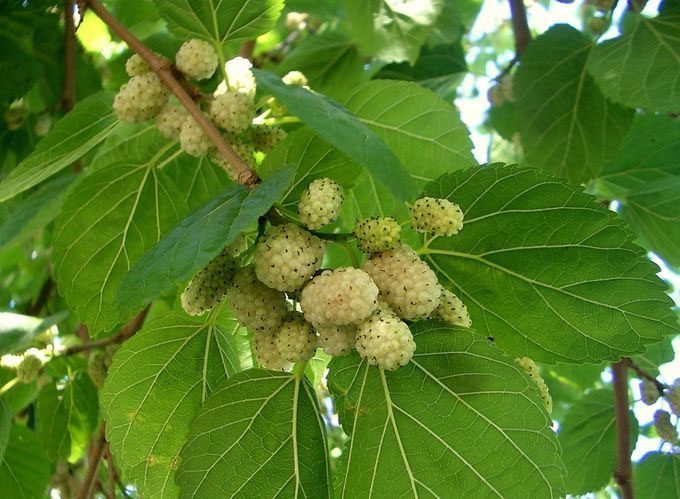This plant is associated with many folk remedies and offers numerous health benefits.
White Mulberry, scientifically known as Morus alba, is a common plant in Vietnam. This tree can grow to a height of 10 to 20 meters with deep roots. Its leaves measure 5 to 10 cm in length and about 4 to 8 cm in width, being thin, soft, and pointed at the tip. The fruit of the white mulberry starts off green or light white and gradually turns red and even deep purple when ripe.
According to scientific studies, the leaves and fruits of the white mulberry are packed with essential nutrients for the body, including iron, riboflavin, vitamin C, vitamin K, potassium, phosphorus, and calcium. Notably, the vitamin C content in white mulberry can reach up to 130% of the daily recommended intake, helping to combat oxidation and cool the body. This plant also contains a significant amount of fiber and a variety of organic compounds such as zeaxanthin, resveratrol, anthocyanins, lutein, and other polyphenolic compounds.
Here are the golden benefits that this plant brings to our health:
1. Blood Sugar Control
Studies have shown that white mulberry contains certain active compounds that work similarly to some medications used for type 2 diabetes. These compounds slow down the digestion and absorption of sugar in the intestines, leading to a slower release of glucose into the bloodstream. This helps maintain blood sugar levels within a stable range.

White mulberry is a common plant in Vietnam.
In four clinical trials involving 101 healthy individuals, extracts from white mulberry leaves reduced the digestion and absorption of carbohydrates, resulting in lower blood sugar levels and a significant increase in insulin following meals.
In a study on mice, mulberry leaves also helped maintain the function of beta cells in the pancreas, which produce insulin.
2. Cancer Prevention
White mulberry is rich in beneficial compounds such as vitamin C, flavonoids, phenolic acids, and active alkaloids that have antioxidant and anti-cancer properties, helping to detoxify harmful free radicals.
White mulberry also contains Cyanidin 3-rutinoside and Cyanidin 3-glucoside. These two anthocyanins exhibit strong anti-cancer properties and can inhibit the invasion and migration of A549 lung cancer cells in humans. Extracts from white mulberry also delay the maturation and induce death in human colorectal cancer cells. Moreover, it halts the cell cycle in cancer cells by reducing the concentration of the cyclin D1 protein in those cells.
3. Heart Health Enhancement
White mulberry is high in fiber and contains about 25% soluble pectin, which can help protect against oxidative damage in the heart and blood vessels while effectively lowering cholesterol levels.
White mulberry is also rich in antioxidants, particularly anthocyanins, which have been extensively studied for their heart-protective effects. In a study published in the Journal of Nutrition, researchers found that the anthocyanins in white mulberry extract significantly reduced free radical damage, leading to the inhibition of LDL oxidation (bad cholesterol). Furthermore, the anthocyanin components of white mulberry are also considered to prevent atherosclerosis (hardening of the arteries).

The vitamin C content in white mulberry can reach up to 130% of the daily recommended intake.
4. Healthy Weight Loss
A study involving 46 overweight individuals demonstrated the remarkable weight loss potential of white mulberry. In this study, the participants were divided into two groups and both followed the same diet of 1300 kcal per day. One group consumed an additional 2400mg of white mulberry extract, while the other received a placebo. After three months, the group consuming white mulberry lost about 10% of their body weight, while the other group only lost 3%.
Other studies have also shown that white mulberry, when combined with other plant extracts, can effectively suppress appetite and reduce fat content.
5. Liver Health
In various studies, scientists have found that white mulberry can prevent fat accumulation in the liver, thereby preventing the onset of fatty liver disease.
Specifically, in 2013, the Journal of Agricultural and Food Chemistry published a study showing that anthocyanins found in white mulberry help prevent fat accumulation and promote the elimination of fat from the liver. Experts concluded that the anthocyanins in this fruit could help prevent non-alcoholic fatty liver disease.
Another study from Taiwan (China) published in this journal yielded similar results. Experts found that white mulberry extract significantly reduced fat accumulation, inhibited fatty acid synthesis, and stimulated the oxidation of fatty acids. They also concluded that white mulberry extract could have a positive effect in effectively preventing fatty liver disease.


















































